![]()
The Words of the Corley Family
|
|
The Words of the Corley Family |
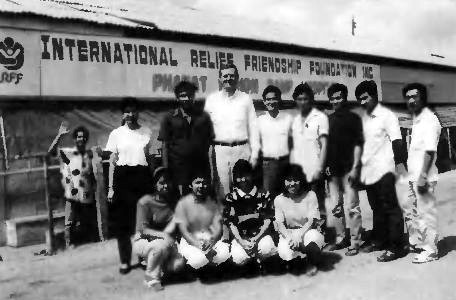
Jack
Corley and members of the Thailand IRFF medical team at a Vietnamese
refugee camp
Question: Were you one of the original six Itinerary Workers (IWs) that Father chose for each continent?
Yes, I was assigned to Asia.
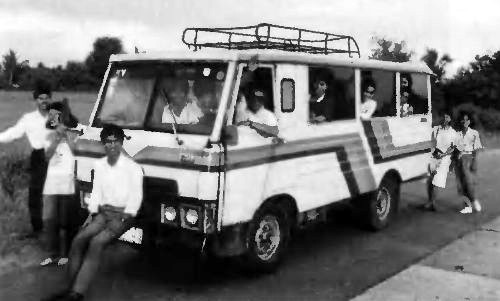
Fundraising
members and their van in the Philippines.
Question: When Father called you to that mission, what were your reactions and thoughts? Can you explain what you felt Father's purpose was in creating that mission?
I couldn't believe it when Father called us up and said, "I'm now going to assign you to different continents." I thought, "No, this is a mistake -- I'm sure he will assign the older leaders, like Paul Werner and Reiner Vincentz; but me, no that couldn't be." I was waiting for Father to look at me and say "Okay, you can sit down," and appoint someone else. But he didn't. After he chose us, Father said there were three things we should be responsible for: first was diplomacy, meaning that we should meet leaders and witness to them about Father; second was education -- giving introductory seminars to nonmembers; and third was internal affairs -- we should be like an elder brother to members such that they would feel free to come and share whatever they are going through.
My feeling, and it has always been this way whenever I have had a change of mission, is that usually the new mission seems to be out of reach, or more than I am ready for or bigger than I can handle. But the process of being in another mission helps you to grow, because when you feel challenged, you grow. That's what I felt on this mission. It required that I trust God, because I knew I could not do it myself. I felt overwhelmed just by the thought of going out as an IW to Asia. I had never been an IW and I had never worked in those parts of Asia before. I had only visited Japan and Korea briefly. So this was a total challenge. What can I do for the members and missionaries who are already out there with years of experience? I had to look inwards to try to understand what I would offer or how I could support them. Mr. Ki Hun Kim, my regional leader, gave the instruction when I went back to Minnesota to gather my things: "Prepare internally before going." So I spent that time trying to prepare internally.
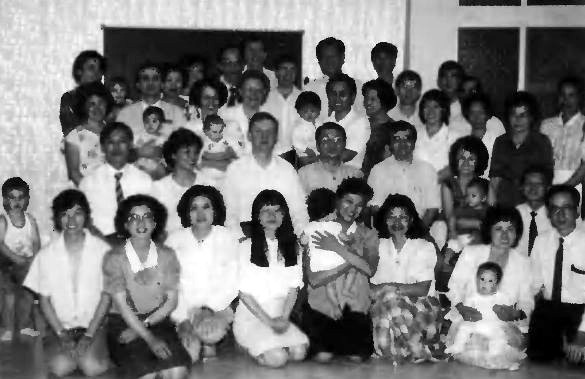
Jack
Corley with members in Kaohsiung, Taiwan
Question: Which mission countries did you serve?
I started off in the Philippines, then traveled to Thailand, Singapore, Malaysia, Indonesia, Hong Kong, China, Taiwan, India, Bangladesh, Nepal, Pakistan, Sri Lanka, and the Republic of Maldives.
Several things stand out. In Southeast Asia there is a great spirit of progress both in the society and in the church. The young people there are very clear, with lots of ambition and direction, especially in places like Taiwan, Malaysia, and Thailand. Their economies, especially in Thailand, are really taking off. I briefly visited Thailand on my way to Korea in 1983, and it was then a very poor country. Now it is quickly developing into one of the new economic powers in East Asia. At Father's 70th birthday celebration, the prizes for greatest growth of our movement were awarded first to Japan and second to Thailand.
Our church in Thailand is progressing very well. There was a good foundation built by the missionaries to Thailand -- Jack Hart and Eva Mackin. Eva was originally in Malaysia, but was sent to Thailand. Then when Rev. Byung Woo Kim came in 1984, he developed and organized the movement very quickly. They have set up excellent video centers, with two in Bangkok alone and also several CARP centers. The main video headquarters is very close to Ramkhamheng University, which is called an "open university." That means students don't have to go to lectures every day; they can study just a few days or a few hours a week. It is attended by approximately 500,000 students. Our center is just one block from the campus. Every day there are more than 100 guests visiting that center alone. They come to study Divine Principle, or to attend Wonhwa-Do classes, or English, German or Japanese classes; they have a library, a study room, and a public restaurant downstairs, run by our members.
The Thai members mentioned that their understanding of the details of the Principle is not that comprehensive because they are of Buddhist, not Judeo-Christian background. What moves them is when they hear about True Parents' life -- they shed tears. One reason they are so moved by True Parents is that they already have a very strong feeling of loyalty towards the Thai king and royal family. Thailand seems to be a country where the royal family are like parental figures. And Thai people, in a very natural way, feel like children to the royal family. So when they hear about the Principle and True Parents, they also feel loyalty to them. Several members have told me they can easily have a deep feeling toward True Parents; they later get to know more of the details of the Principle.
The goal of Thailand for the New World Festival Blessing is 10,000 people. So they are working day and night.
Until April 1989, Southeast Asia was divided into three regions: Thailand, Malaysia, Singapore and Indonesia as one region; the Philippines as the second; and Taiwan and Hong Kong as the third. But now all of them are together under Rev. Kim.
Actually, the Philippines was the first country I went to. It is a poor country. Some things were quite difficult to deal with. For example, the food caused great havoc with my stomach, and I was a feast for the mosquitoes. I got used to it and in the end I had no problems whatsoever.
There is a great spirit in the Philippines. One thing that struck me right away was an enthusiasm that I feel is missing here. In a sense, the movement over there is at a youthful state, like our movement was here in the 70s when most members joined. Many of the countries in that area, especially the Philippines, have that kind of spirit. I feel I actually received more from the members than I could give to them. I flew all over the country visiting the centers and speaking at meetings. I came away more inspired than I probably inspired them. One of the great joys of the whole mission was that I gained energy through these members, just being with them and seeing their spirit and their numbers.
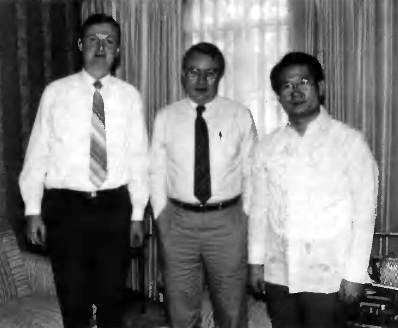
From
left to right: Mr. Jack Corley, Ambassador Sokolov, and Philippines
national leader Mr. Yoshinobu Murotani.
At the same time, their situation is much more difficult than ours in the West. We take things for granted. I've lived in America since 1983 and even compared to Europe, America is better developed. I had gotten used to the American way, but when I went to the Philippines and some other countries in my region, I realized there is so much we take for granted that they don't have out there. Members have to contend with many more challenges than here. First of all, it is always very hot, and mosquito infested.
I went to the south part of the Philippines and was also impressed by the spirit there. The members had bought land and with their own hands built a really nice workshop center. They have a small rice farm and several other buildings. The American missionary there, Ron Bucyk, knows about construction, so he organized everything.
Especially in the Philippines, members were very forthcoming about their struggles -- more than any other country. They were not shy to come and talk about things. So a lot of my time was spent like a Catholic priest hearing confessions. It was a very moving experience because I really felt that they were my younger brothers and sisters. If I could figure out a way to help them, then we formed a bond that was special. I experienced a lot of joy through the heartistic connections established by trying to help members deal with their difficulties. I see if I ever meet those members again, there will always be that close feeling. One of the things that inspired me was to see how I could help someone overcome their problems or come closer in their understanding of True Parents.
One impressive point in the Philippines is the level of contact with politicians, religious leaders, and academic leaders. They have established strong contacts that members have developed over the years. I could meet politicians and presidents of universities who were connected to CAUSA, the World Media Association, and PWPA. I spent a whole day just going from one congressman and senator to another, speaking to them about all the projects that Father is doing. I was amazed at how open they were, and also I was very surprised that quite a few professors are waiting for the Blessing and come to pledge in the morning. There is one professor, Dr. Galang, who is a really amazing man. He is over 80 years old, yet he is one of the most active and enthusiastic members in the Philippines. He had a very distinguished career in the past, and is still very active.
I had a chance to meet the Soviet ambassador in the Philippines. He had worked in America, as the top Soviet diplomat in New York. I met him by accident, because I was meeting the president of a university and this Soviet ambassador was visiting a millennial celebration of the Russian Orthodox Church being held at the university. I thought, "Here's the Soviet ambassador, and since we are now embracing leadership people in the Soviet Union, I should witness to him about Father." He came over to the group of politicians, including the mayor, that I was with and started introducing himself. I shook his hand and he said, "Hello, I am Ambassador Sokolov from the Soviet Union." Then I remembered the instruction Father gave to the missionaries: "When you go out you are like an ambassador on behalf of True Parents." So I said, "Hello, I am Ambassador Corley." He was kind of shocked, and asked, "From which country?" I answered, "Actually I'm representing Rev. Moon. I am an ambassador on his behalf." He told me he knew of Rev. Moon, so I said, "You are working for world peace in the Soviet Union, right? Rev. Moon has also been working for world peace for many years now.
So I think we should work together." Then I presented him a copy of the New Vision for World Peace. I asked him, "Do you mind if we have our photograph taken together?" and he said, "Sure, no problem." As we were preparing for the photo, the politicians wanted to stand with us, but the ambassador said, "No, no, everybody away, just the two ambassadors." Then later he gathered everyone else for a group photo.
In January 1990 when I returned to the Philippines one Filipino brother made an arrangement for me to meet this ambassador again. It was on very short notice, since I was leaving the next day for Bangkok, but we asked for an appointment and he said, "Yes, come right over." Within an hour the Philippines national leader and myself met him at the embassy. We spent an hour and a half witnessing about Father.
I gave him a tape of Father's interview with the Soviet Union journalists, and more copies of New Vision for World Peace. We explained to him about the New World Festival, the International Highway, and other projects. My wife works at The Washington Times, so I half-jokingly said to him, "I am sorry, I think The Washington Times must have given you and your government many headaches." And he said, "No, The Washington Times made us think." It reminded me of when Father recently said, "I wish you could understand how much The Washington Times was responsible for what is happening in Eastern Europe." Just before ending the meeting, he repeatedly said, "I am so happy you didn't forget us."
Next, I travelled to Malaysia. All of the members are Chinese, because it is illegal for native Malaysians to leave their national Muslim religion. We can't print literature in the Malay language, because that suggests we want to witness to them, so all of our literature is printed in Chinese or English. The Malaysian members are well-established, though.
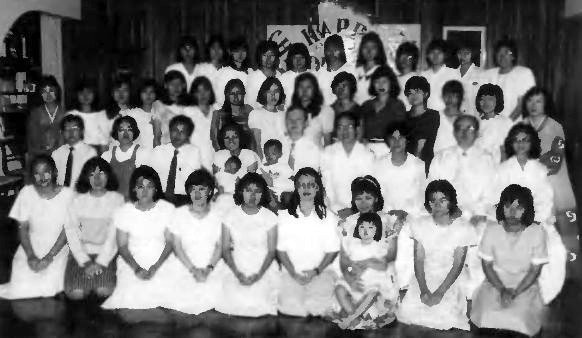
Brothers
and sisters gather for Children's Day celebration in Kuala Lumpur,
Malaysia.
The Taiwanese Church, from 1975 until now, was banned. The movement has continued underground over the years, but its development has been hampered. When Rev. Byung Woo Kim became Regional Leader, one of the first things he focused on was regaining the legality of our church in Taiwan. He appointed one brother there as a public relations person, who began to organize letters of support from PWPA professors throughout the world. When I visited I was able to meet with government officials, who told us that they were positively considering our application for reregistration. I heard later that in February or March of 1990 it was approved. So the church is ready to grow in Taiwan, and they have a lot of hope.
Also, in Hong Kong, a new headquarters was purchased. This is a new beginning and I think they are going to do quite well. While in Hong Kong the national leader and I visited China for one day and met some protesting students. It was just a week or so before the Tiananmen Square tragedy. I was inspired by the students' attitude. I feel once China is liberated, it will become a world power. Father's concern and vision for China reaches beyond its present oppressive situation far into the future. God has a special providence for these one billion people. The Chinese can be a very powerful force for goodness in the future if they unite with Father. This experience with the Chinese students helped me to understand why Father has so much hope in the future of China. Question: How do these countries perceive the West?
Many people have two or three feelings about the West. It is almost a paradox. On the one hand they have a certain respect. But they also think the West is rather decadent -- they feel shocked at some of the things they hear about America and they see TV programs which constantly highlight those problems in the West. Also, many countries had a bad experience with colonialism -- the Chinese with the Opium War and the Malays with the British, for example. Generally there is some resentment about that. They have a mixed view, with respect and resentment toward the past and shock at present Western lifestyle.
As a Westerner I feel we have a lot to learn from each other. I feel that the strength of the family in Asia is something the West, especially America, needs to learn. Morality in the West is very weak, too. One thing I believe these Asian countries need is more of a public sense. I feel the American system of federal, state and local government is a very well-organized structure, with a good balance between the whole and the individual. It doesn't always work because of individual failings, but it is well set-up. It is not so well set-up in some of those countries.
India is a whole different experience from Southeast Asia. When you go then for the first time, it is a shock to all of your senses -- of smell, hearing, seeing, and eating. But then the second time I went back I was looking forward to it.
There is an intense aspect of humanity there. Everything is out in the open, good and bad. In America we have great cities, but after 6 p.m. many of them become completely deserted. In India, there is human life everywhere, until late at night. You feel constantly around people. People are always intermingling, having a lot of give and take. In America, people are in their air-conditioned offices, cars and houses, causing a lot of separation.
India has been a difficult place to work. There is a lot of spiritual confusion, which I think is due to the concept of many gods. For me the striking thing was to go from India to Pakistan, Bangladesh, and Sri Lanka, because they are Muslim countries. They are also very poor, but the spiritual feeling is different because they believe in one God.
The Regional Leader, Robert Kittel, has developed a very good lecture system, well suited to that region. There are Hindus, Siiks, Muslims, Christians, Buddhists, and several other small groups in that area, so when you lecture Principle, you have to be able to satisfy all of them. Robert has done a good job of studying and compiling all the different religious beliefs, so when he presents Divine Principle, workshop guests seem so happy to be acknowledged by a Judeo-Christian preacher. A lot of indemnity has been paid by the missionaries and now things are beginning to move forward. A great work is also being done through the RYS and IRF. I think on that level there is hope to influence the leadership in India.
Nepal is a country I would like to mention. They have three centers, and the missionary there has persevered for many years. So this year, in Korea, he got special recognition as one of the two countries that under difficult circumstances had brought good result. I think recent changes in Nepal come from the spiritual conditions being set there. The country is now changing. Christianity has been outlawed in Nepal until recently, but our church has over a hundred home members. The people of Nepal are so friendly; they are really loving people. It was one of the countries which I really enjoyed visiting.
Question: Are the missionaries raising up native members to take over the leadership?
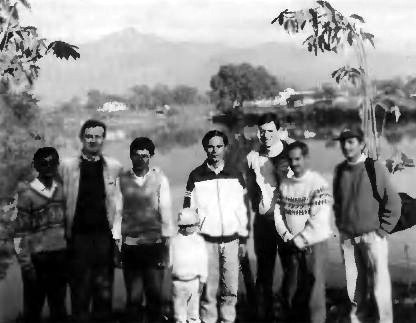
Visiting
the pioneering city of Pokhara, Nepal. Third from the right is the
missionary to Nepal, Reiner Schmeidel.
In Nepal, one brother was being raised up to become the national leader, but he was murdered in August 1989. He was blessed in Korea, stayed for the mobilization, and then was accepted to come to the Unification Theological Seminary. He returned to Nepal to arrange his passport and while walking to his home he was attacked by some thieves and killed.
It was a big shock, since he was a very good brother who brought in many members. In one city where he pioneered all the members were his spiritual children. It was a big loss and indemnity, but I think the shock and initial discouragement to the members helped to strengthen them. They are determined to continue the mission and are witnessing vigorously. I am sure his spirit is behind them.
In Bangladesh, the missionary has worked mostly with professors. Last Christmas I was there for one day to give a workshop, and they had about 15 guests, mostly graduate students. They have conferences and publish their own books. Bangladesh is one of the poorest countries in the world, but they have very good professors who respect Father a great deal.
In Pakistan the missionary has visited Afghanistan six times with the Mujahedeen. He is an excellent reporter for the Sekai Nippo. Now that the Afghanistan situation has eased, he is focusing more on witnessing.
In Sri Lanka, there are just a handful of members, but they are very dedicated. I was there twice, and it was very dangerous. The first time I visited, the terrorists had imposed a curfew that anybody driving would be shot. It scared all the taxi drivers and so we had to stay at a hotel near the airport that night. A lot of people have been killed. The second time I went there it was an easier atmosphere, so I visited the central part of the city. They call Sri Lanka "Paradise Island," and it really lives up to its name; the Adams and Eves are causing problems but the creation is beautiful.
As I went around to these countries, I felt that members have such a longing to know more about True Parents. Many times I would give talks based on what Rev. Won Pil Kim or the early disciples spoke about Father's life, things that those members knew about, but they wanted to hear those stories again. Many times they were shedding tears as they listened. There is a deep thirst to be close to True Parents. They have never seen True Parents, but have been working in very difficult situation. American members just pop over to Belvedere on Sunday morning to listen to Father or the True Family, but those members would give almost anything to have that experience even one time. So although they are physically very far away from True Parents, many times they are spiritually closer because of their longing. Father must have such a special feeling toward these members, because they don't have the opportunities we have yet they have to keep the same faith and work just as hard as we do.
Jesus said, in John 20:29, "Blessed are those who have not seen and yet believe." So I tried to encourage them: "Don't feel bad if you never see True Parents, because actually you have been very close to them." I got a sense of how Father must feel toward these members. For providential reasons he must invest more in certain countries, and other countries must struggle along, but Father never forgets those members. I would share one story about Father with them. Several years ago the sisters at East Garden would bring a bowl of fresh fruit to Father's room, beautifully prepared, and put it on his table. Upon returning the next day it wasn't touched, nor the next day, until it began to go bad. They would have to take it away and bring back more fresh fruit. Soon they realized that Father was not touching the fruit. Father explained, "I cannot eat that fruit because I think about my children somewhere in the world who are suffering with one or two poor meals a day. So how can I eat extra?" The staff stopped bringing the fruit.
When I told members about this they started crying, because they felt they are not forgotten. Father is thinking about them, wanting to sympathize with their real situation. He is very close to those members, and especially those from communist countries. Father said that when those countries are liberated, he will gather the brothers and sisters and speak to them in a way he never spoke to us. I had many deep experiences this way, seeing members and realizing how blessed we are in the West as a society and as a church. We don't appreciate as much as we should how blessed we are.